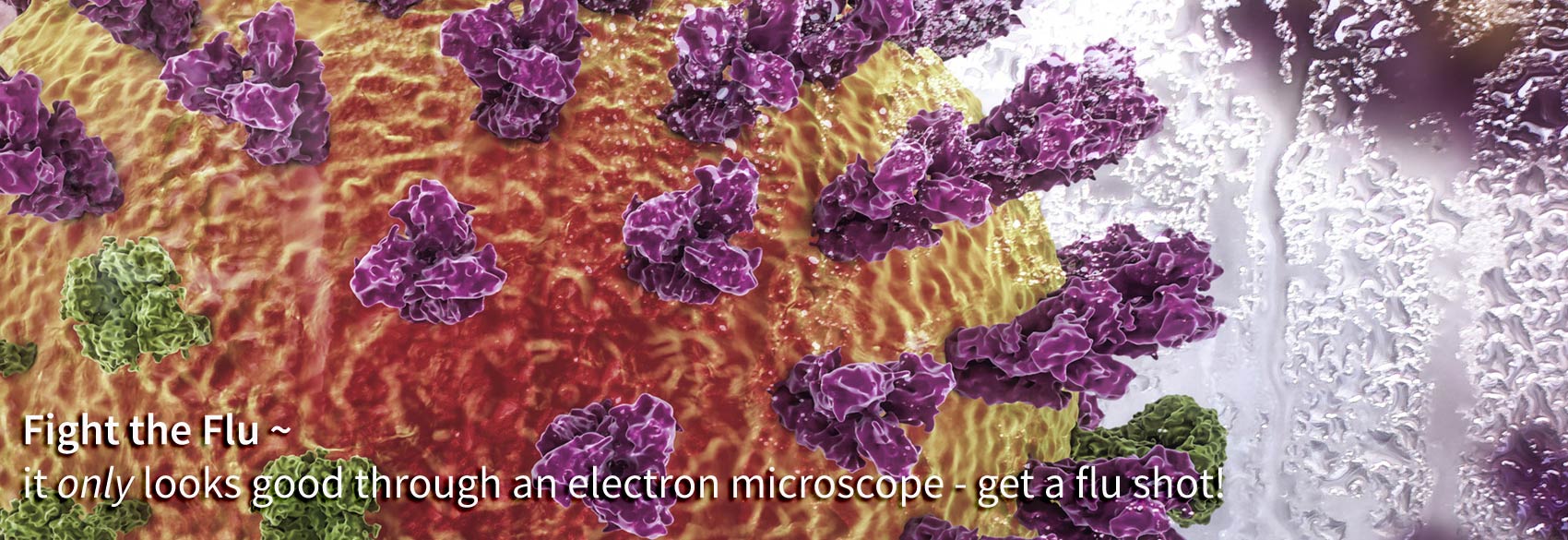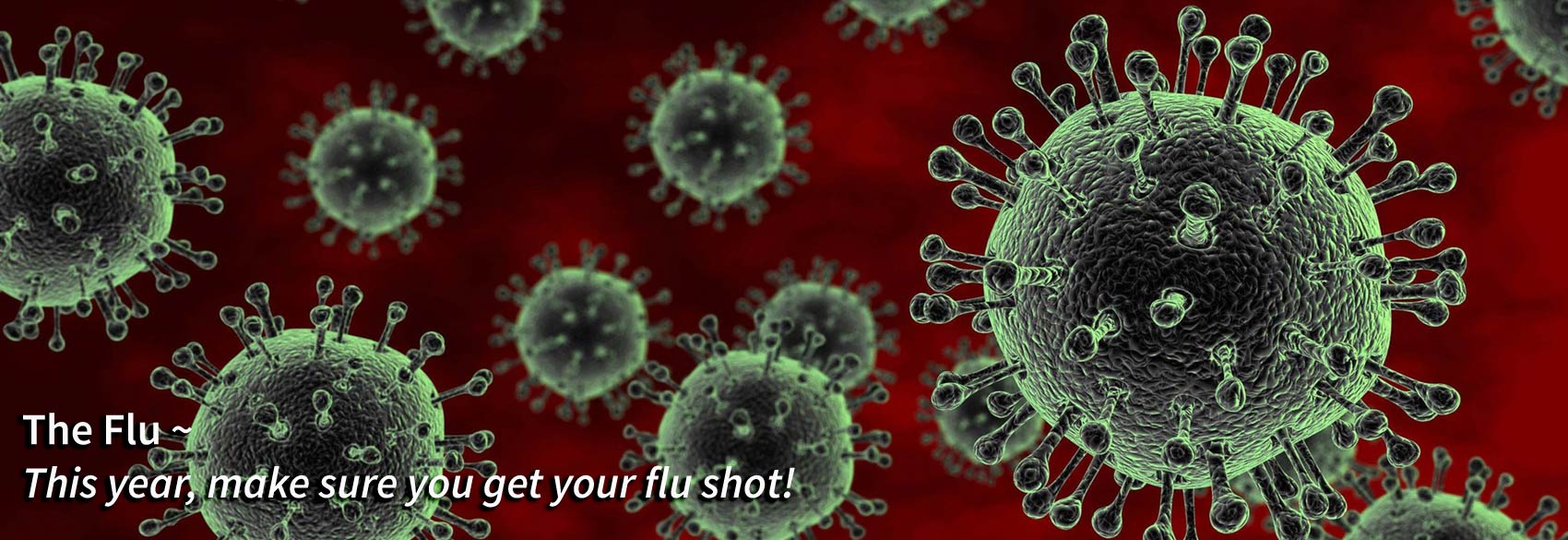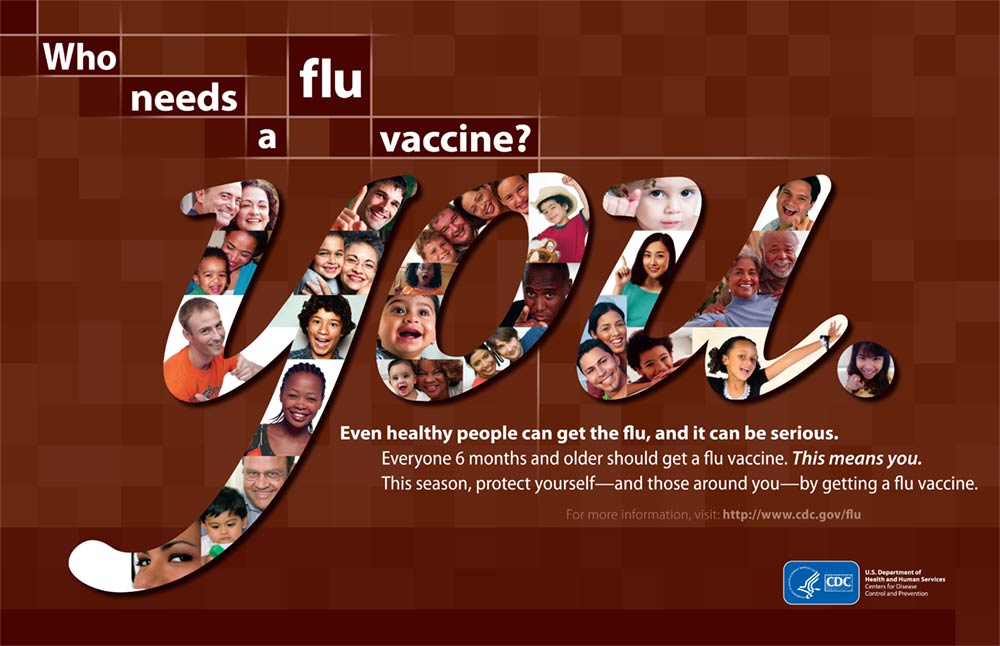Time to get your Flu Shot
From New Milford Medical Group

It was exactly 100 years ago that the world suffered through the worst pandemic since the Black Death swept through the world in the Middle Ages; the influenza epidemic of 1918 killed about 675,000 Americans, it was the most severe pandemic in recent history, sweeping the globe more quickly that any disease had ever spread before, killing more than 50 million people. This was nearly as many as would perish in the Second World War! Fortunately, today we can control much of the damage that the flu can cause to populations. This is partly through mitigating risks, and partly through the flu shot. The CDC recommends a yearly flu vaccine as the first and most important step in protecting against influenza and its potentially serious complications.
While there are many different flu viruses, flu vaccines protect against the 3 or 4 viruses that research suggests will be most common. Three-component vaccines contain an H3N2, an H1N1 and a B virus. Four component vaccines have an additional B virus component.

The single best way to protect against the flu is to get vaccinated each year.
Why should people get vaccinated against the flu?
Influenza is a potentially serious disease that can lead to hospitalization and sometimes even death. Every flu season is different, and influenza infection can affect people differently, but millions of people get the flu every year, hundreds of thousands of people are hospitalized and thousands or tens of thousands of people die from flu-related causes every year. An annual seasonal flu vaccine is the best way to help protect against flu. Vaccination has been shown to have many benefits including reducing the risk of flu illnesses, hospitalizations and even the risk of flu-related death in children.
How do flu vaccines work?
Flu vaccines cause antibodies to develop in the body about two weeks after vaccination. These antibodies provide protection against infection with the viruses that are in the vaccine.
The seasonal flu vaccine protects against the influenza viruses that research indicates will be most common during the upcoming season. Traditional flu vaccines (called “trivalent” vaccines) are made to protect against three flu viruses; an influenza A (H1N1) virus, an influenza A (H3N2) virus, and an influenza B virus. There are also flu vaccines made to protect against four flu viruses (called “quadrivalent” vaccines). These vaccines protect against the same viruses as the trivalent vaccine and an additional B virus.

Misconceptions about Flu Vaccines
Can a flu shot give you the flu?
No, a flu shot cannot cause flu illness. Flu vaccines given with a needle are currently made in two ways: the vaccine is made either with a) flu vaccine viruses that have been ‘inactivated’ and are therefore not infectious, or b) with no flu vaccine viruses at all (which is the case for recombinant influenza vaccine). The most common side effects from the influenza shot are soreness, redness, tenderness or swelling where the shot was given. Low-grade fever, headache and muscle aches also may occur.
Are any of the available flu vaccines recommended over the others?
For the 2018-2019 flu season, the Advisory Committee on Immunization Practices (ACIP) recommends annual influenza vaccination for everyone 6 months and older with any licensed age-appropriate flu vaccine including inactivated influenza vaccine (IIV), recombinant influenza vaccine (RIV4) or live attenuated influenza vaccine (LAIV4) with no preference expressed for any one vaccine over another.
Is it better to get the flu than the flu vaccine?
No. Flu can be a serious disease, particularly among young children, older adults, and people with certain chronic health conditions, such as asthma, heart disease or diabetes. Any flu infection can carry a risk of serious complications, hospitalization or death, even among otherwise healthy children and adults. Therefore, getting vaccinated is a safer choice than risking illness to obtain immune protection.
Do I really need a flu vaccine every year?
Yes. CDC recommends a yearly flu vaccine for just about everyone 6 months and older, even when the viruses the vaccine protects against have not changed from the previous season. The reason for this is that a person’s immune protection from vaccination declines over time, so an annual vaccination is needed to get the “optimal” or best protection against the flu.
Why do some people not feel well after getting the seasonal flu vaccine?
Some people report having mild reactions to flu vaccination. The most common reaction to the flu shot in adults has been soreness, redness or swelling at the spot where the shot was given. This usually lasts less than two days. This initial soreness is most likely the result of the body’s early immune response reacting to a foreign substance entering the body. Other reactions following the flu shot are usually mild and can include a low grade fever and aches. If these reactions occur, they usually begin soon after the shot and last 1-2 days. The most common reactions people have to flu vaccine are considerably less severe than the symptoms caused by actual flu illness.
What about people who get a seasonal flu vaccine and still get sick with flu symptoms?
There are several reasons why someone might get a flu symptoms, even after they have been vaccinated against flu.
- One reason is that some people can become ill from other respiratory viruses besides flu such as rhinoviruses, which are associated with the common cold, cause symptoms similar to flu, and also spread and cause illness during the flu season. The flu vaccine only protects against influenza, not other illnesses.
- Another explanation is that it is possible to be exposed to influenza viruses, which cause the flu, shortly before getting vaccinated or during the two-week period after vaccination that it takes the body to develop immune protection. This exposure may result in a person becoming ill with flu before protection from the vaccine takes effect.
- A third reason why some people may experience flu like symptoms despite getting vaccinated is that they may have been exposed to a flu virus that is very different from the viruses the vaccine is designed to protect against. The ability of a flu vaccine to protect a person depends largely on the similarity or “match” between the viruses selected to make the vaccine and those spreading and causing illness. There are many different flu viruses that spread and cause illness among people. For more information, see Influenza (Flu) Viruses.
-
The final explanation for experiencing flu symptoms after vaccination is that the flu vaccine can vary in how well it works and some people who get vaccinated may still get sick.
Should I wait to get vaccinated so that my immunity lasts through the end of the season?
CDC and the Advisory Committee on Immunization Practices (ACIP) recommend that flu vaccinations begin by the end of October, if possible. However, as long as flu viruses are circulating, it is not too late to get vaccinated, even in January or later. While seasonal flu outbreaks can happen as early as October, most of the time flu activity peaks between December and February, although activity can last as late as May. Since it takes about two weeks after vaccination for antibodies to develop in the body that protect against flu virus infection, it is best that people get vaccinated in time to be protected before flu viruses begin spreading in their community. Although immunity obtained from flu vaccination can vary by person, previously published studies suggest that immunity lasts through a full flu season for most people.

- CDC recommends a yearly flu vaccine as the first and most important step in protecting against influenza and its potentially serious complications.
- While there are many different flu viruses, flu vaccines protect against the 3 or 4 viruses that research suggests will be most common. Three-component vaccines contain an H3N2, an H1N1 and a B virus. Four component vaccines have an additional B virus component. (See Vaccine Virus Selection on the CDC's website for this season’s vaccine composition.)
- Flu vaccination can reduce flu illnesses, doctors’ visits, and missed work and school due to flu, as well as prevent flu-related hospitalizations.
- Flu vaccination also has been shown to significantly reduce a child’s risk of dying from influenza.
- Also, there are data to suggest that even if someone gets sick after vaccination, their illness may be milder.
- Everyone 6 months of age and older should get a flu vaccine every year before flu activity begins in their community. CDC recommends getting vaccinated by the end of October.
- For the 2018-2019 flu season, CDC and its Advisory Committee on Immunization Practices (ACIP) recommend annual influenza vaccination for everyone 6 months and older with any licensed, age-appropriate flu vaccine (inactivated, recombinant or nasal spray flu vaccines) with no preference expressed for any one vaccine over another. (See Types of Flu Vaccines on the CDC's website).
- Vaccination of high risk persons is especially important to decrease their risk of severe flu illness.
- People at high risk of serious flu complications include young children, pregnant women, people with chronic health conditions like asthma, diabetes or heart and lung disease and people 65 years and older.
- Vaccination also is important for health care workers, and other people who live with or care for high risk people to keep from spreading flu to them.
-
Infants younger than 6 months are at high risk of serious flu illness, but are too young to be vaccinated. Studies have shown that flu vaccination of the mother during pregnancy can protect the baby after birth from flu infection for several months. People who live with or care for infants should be vaccinated.
Take everyday preventive actions to stop the spread of germs.
- Try to avoid close contact with sick people.
- While sick, limit contact with others as much as possible to keep from infecting them.
- If you are sick with flu-like illness, CDC recommends that you stay home for at least 24 hours after your fever is gone except to get medical care or for other necessities. (Your fever should be gone for 24 hours without the use of a fever-reducing medicine.)
- Cover your nose and mouth with a tissue when you cough or sneeze. After using a tissue, throw it in the trash and wash your hands.
- Wash your hands often with soap and water. If soap and water are not available, use an alcohol-based hand rub.
- Avoid touching your eyes, nose and mouth. Germs spread this way.
-
Clean and disinfect surfaces and objects that may be contaminated with germs like flu.
Take flu antiviral drugs if your doctor prescribes them.
- If you get sick with flu, antiviral drugs can be used to treat your illness.
- Antiviral drugs are different from antibiotics. They are prescription medicines (pills, liquid or an inhaled powder) and are not available over-the-counter.
- Antiviral drugs can make illness milder and shorten the time you are sick. They may also prevent serious flu complications.
- CDC recommends prompt antiviral treatment of people who are severely ill and people who are at high risk of serious flu complications who develop flu symptoms.
- For people with high-risk factors, treatment with an antiviral drug can mean the difference between having a milder illness versus a very serious illness that could result in a hospital stay.
- Studies show that flu antiviral drugs work best for treatment when they are started within 48 hours of getting sick, but starting them later can still be helpful, especially if the sick person has a high-risk health condition or is very sick from flu. Follow your doctor’s instructions for taking this drug.
-
Flu-like symptoms include fever, cough, sore throat, runny or stuffy nose, body aches, headache, chills and fatigue. Some people, especially children, may have vomiting and diarrhea. People may also be infected with flu and have respiratory symptoms without a fever.
Getting a flu vaccine every year is the best way to protect yourself and your family from flu and its potentially serious complications. CDC recommends that everyone 6 months and older get vaccinated by the end of October.
What is new this flu season?
- Flu vaccines have been updated to better match circulating flu viruses
• Any licensed, age-appropriate flu vaccines are recommended
• The nasal spray flu vaccine (LAIV) is again a vaccine option. Ask your health care provider about what vaccine is right for you
Fight flu this season by getting your flu vaccine and encouraging others to protect themselves and their loved ones by doing the same.










